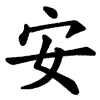安
- peaceful, calm, secure;
- safe, at ease;
Etymology
Ideogrammatic compound:
宀 (roof, house) — indicates a dwelling or home.
女 (woman) — represents a woman.
Originally depicted “a woman within the house”, symbolizing peace, stability, and safety at home.
Semantic range:
- peace, tranquility, safety;
- to pacify, to settle;
- comfortable, secure, at ease;
- interrogative “how, why” (classical usage).
Usage in Korean
안전 (安全) — safety, security
안심 (安心) — relief, peace of mind
불안 (不安) — anxiety, unease
평안 (平安) — peace, tranquility
안위 (安危) — safety and danger
안락 (安樂) — comfort, ease
Additional notes
In Buddhist texts, 安 often connotes spiritual tranquility and freedom from suffering (안락국, 安樂國 = Pure Land).
安 is widely used in Christian vocabulary to translate peace (eirēnē / shalom), as in 平安 (“peace be with you”). In Christian theology, true 安 is not only physical safety but the spiritual peace and rest that come from reconciliation with God through Christ.
Words that derived from 安
- 미안(未安)–being sorry
- 미안하다(未安하다)–regrettable; sorry; I am sorry
- 보안(保安)–security
- 불안(不安)–uneasiness; anxiety; uncertainty; insecurity
- 안녕하다(安寧하다)–peaceful; calm; healthy
- 안락(安樂)–ease; comfort
- 안락의자(安樂椅子)–easy chair; armchair
- 안면(安眠)–sound sleep; comfortable sleep
- 안보(安保)–security
- 안식(安息)–rest; repose; relaxation
- 안식일(安息日)–Sabbath; Lord´s day
- 안식처(安息處)–shelter
- 안심(安心)–relief; peace of mind; assurance
- 안일(安逸)–ease; idleness; indolence
- 안전(安全)–safety
- 안전 보장(安全保障)–security; security assurance
- 안전벨트(安全belt)–safety belt
- 안정화(安定化)–stabilization
- 안착(安着)–safe arrival; safe receipt; settlement
- 안타(安打)–hit; safety; base hit
- 편안(便安)–comfort; ease
- 편안하다(便安하다)–comfortable; being at ease
